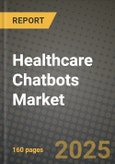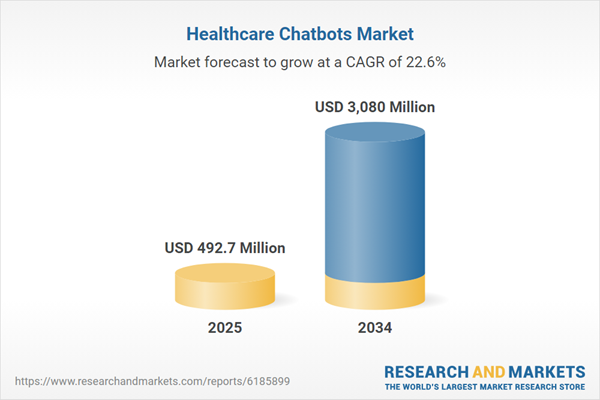The Healthcare Chatbots Market has emerged as a dynamic and rapidly evolving segment within the broader digital health landscape. These AI-powered conversational agents are designed to simulate human interaction, offering support for various medical functions such as appointment scheduling, medication reminders, symptom checking, and mental health assistance. With growing demand for personalized, real-time, and cost-effective healthcare services, chatbots are being increasingly adopted across hospitals, clinics, insurance companies, and even directly by consumers. Their integration with telemedicine platforms and electronic health records is transforming the way patients access and interact with healthcare systems. Moreover, the rising prevalence of chronic diseases, aging populations, and increasing healthcare costs are pushing stakeholders to explore automation-driven solutions to enhance efficiency and accessibility. As awareness and trust in digital health tools grow, the healthcare chatbots market is witnessing sustained investments and innovations from both startups and major tech-health partnerships.
The healthcare chatbots market saw notable advancements in natural language processing (NLP), enabling more accurate and empathetic conversations. Companies focused on refining multilingual support and expanding chatbot functionalities to include mental health and behavioral therapy services. Integration with wearable devices became more prevalent, allowing chatbots to deliver personalized health insights in real-time. Additionally, regulatory bodies across key markets such as the U.S. and Europe showed increased interest in formalizing guidelines for AI use in patient care, promoting safer implementation. Tech giants collaborated with healthcare providers to co-develop solutions that address post-operative care and chronic condition management. The market also witnessed rising adoption across developing regions as mobile health penetration and digital infrastructure improved. Meanwhile, several pilot programs demonstrated the effectiveness of AI chatbots in triaging non-emergency cases, reducing pressure on frontline health workers and emergency departments.
The healthcare chatbots market is poised for deeper integration into mainstream healthcare delivery. Emerging technologies such as generative AI and multimodal conversational agents are expected to make chatbots even more intelligent and context-aware. Future developments will likely emphasize emotional intelligence, allowing bots to detect mood changes or mental distress, thus contributing to early intervention. Governments and private healthcare systems are expected to scale deployment of chatbots for population health management, particularly in managing large-scale vaccination drives, health awareness campaigns, and screening initiatives. As interoperability standards mature, chatbot systems will be seamlessly linked with EMR/EHR platforms, diagnostic tools, and digital therapeutics, offering a unified patient experience. Additionally, the rise of value-based care models will drive providers to invest in AI tools that improve patient engagement and health outcomes while optimizing resource use. The market will also see growing demand for enterprise-grade solutions with stronger data privacy and compliance features.
Key Insights: Healthcare Chatbots Market
- Increased deployment of AI chatbots for mental health support, providing cognitive behavioral therapy and stress management tools as part of digital wellness offerings.
- Rising integration of healthcare chatbots with wearable devices and health apps to enable continuous patient monitoring and timely alerts.
- Expansion of multilingual chatbot capabilities to serve diverse populations across global markets and improve healthcare accessibility.
- Adoption of voice-based conversational interfaces, enhancing user convenience for elderly patients and individuals with disabilities.
- Surge in chatbot use for post-discharge care and chronic disease management, aiming to reduce hospital readmissions and improve long-term patient engagement.
- Growing patient preference for on-demand, personalized health information through digital platforms is driving chatbot adoption across healthcare settings.
- Rising healthcare costs and staff shortages are encouraging providers to automate administrative and preliminary clinical interactions.
- Widespread smartphone usage and expanding internet access in emerging markets are creating fertile ground for chatbot-based health services.
- Advancements in AI and natural language processing are significantly improving the effectiveness and reliability of chatbot responses in clinical scenarios.
- Ensuring patient data privacy and meeting regulatory compliance standards remains a major challenge, especially as chatbots handle sensitive health information across jurisdictions.
Healthcare Chatbots Market Segmentation
By Component
- Software
- Services
By Deployment Model
- On-Premise Model
- Cloud-Based Model
By Application
- Symptoms Check
- Appointment Scheduling and Monitoring
- Medical and Drug Information Assistance
- Other Applications
By End User
- Patients
- Healthcare Providers
- Insurance Companies
- Other End Users
Key Companies Analysed
- Your.MD Ltd.
- HealthTap Inc.
- Sensely Inc.
- Buoy Health Inc.
- Infermedica
- Babylon Health
- Baidu Inc.
- Ada Digital Health Ltd.
- Pact Care BV
- Woebot Labs Inc.
- GYANT.Com Inc.
- Ada Health GmbH
- Microsoft Corporation
- Inbenta Holdings Inc.
- Anboto Labs
- Florence Healthcare
- Conversa Health Inc.
- Memora Health Inc.
- K Health Inc.
- HealthJoy
- SimplifiMed
- Mediktor
- Catalia Health
- 2Morrow Inc.
- PharmAssistant
- Fern Health
- HealthIBX
- HealthXM
- HealthSapiens
- 98point6 Technologies
- HealthTensor.
Healthcare Chatbots Market Analytics
The report employs rigorous tools, including Porter’s Five Forces, value chain mapping, and scenario-based modeling, to assess supply-demand dynamics. Cross-sector influences from parent, derived, and substitute markets are evaluated to identify risks and opportunities. Trade and pricing analytics provide an up-to-date view of international flows, including leading exporters, importers, and regional price trends.Macroeconomic indicators, policy frameworks such as carbon pricing and energy security strategies, and evolving consumer behavior are considered in forecasting scenarios. Recent deal flows, partnerships, and technology innovations are incorporated to assess their impact on future market performance.
Healthcare Chatbots Market Competitive Intelligence
The competitive landscape is mapped through proprietary frameworks, profiling leading companies with details on business models, product portfolios, financial performance, and strategic initiatives. Key developments such as mergers & acquisitions, technology collaborations, investment inflows, and regional expansions are analyzed for their competitive impact. The report also identifies emerging players and innovative startups contributing to market disruption.Regional insights highlight the most promising investment destinations, regulatory landscapes, and evolving partnerships across energy and industrial corridors.
Countries Covered
- North America - Healthcare Chatbots market data and outlook to 2034
- United States
- Canada
- Mexico
- Europe - Healthcare Chatbots market data and outlook to 2034
- Germany
- United Kingdom
- France
- Italy
- Spain
- BeNeLux
- Russia
- Sweden
- Asia-Pacific - Healthcare Chatbots market data and outlook to 2034
- China
- Japan
- India
- South Korea
- Australia
- Indonesia
- Malaysia
- Vietnam
- Middle East and Africa - Healthcare Chatbots market data and outlook to 2034
- Saudi Arabia
- South Africa
- Iran
- UAE
- Egypt
- South and Central America - Healthcare Chatbots market data and outlook to 2034
- Brazil
- Argentina
- Chile
- Peru
Research Methodology
This study combines primary inputs from industry experts across the Healthcare Chatbots value chain with secondary data from associations, government publications, trade databases, and company disclosures. Proprietary modeling techniques, including data triangulation, statistical correlation, and scenario planning, are applied to deliver reliable market sizing and forecasting.Key Questions Addressed
- What is the current and forecast market size of the Healthcare Chatbots industry at global, regional, and country levels?
- Which types, applications, and technologies present the highest growth potential?
- How are supply chains adapting to geopolitical and economic shocks?
- What role do policy frameworks, trade flows, and sustainability targets play in shaping demand?
- Who are the leading players, and how are their strategies evolving in the face of global uncertainty?
- Which regional “hotspots” and customer segments will outpace the market, and what go-to-market and partnership models best support entry and expansion?
- Where are the most investable opportunities - across technology roadmaps, sustainability-linked innovation, and M&A - and what is the best segment to invest over the next 3-5 years?
Your Key Takeaways from the Healthcare Chatbots Market Report
- Global Healthcare Chatbots market size and growth projections (CAGR), 2024-2034
- Impact of Russia-Ukraine, Israel-Palestine, and Hamas conflicts on Healthcare Chatbots trade, costs, and supply chains
- Healthcare Chatbots market size, share, and outlook across 5 regions and 27 countries, 2023-2034
- Healthcare Chatbots market size, CAGR, and market share of key products, applications, and end-user verticals, 2023-2034
- Short- and long-term Healthcare Chatbots market trends, drivers, restraints, and opportunities
- Porter’s Five Forces analysis, technological developments, and Healthcare Chatbots supply chain analysis
- Healthcare Chatbots trade analysis, Healthcare Chatbots market price analysis, and Healthcare Chatbots supply/demand dynamics
- Profiles of 5 leading companies - overview, key strategies, financials, and products
- Latest Healthcare Chatbots market news and developments
Additional Support
With the purchase of this report, you will receive:- An updated PDF report and an MS Excel data workbook containing all market tables and figures for easy analysis.
- 7-day post-sale analyst support for clarifications and in-scope supplementary data, ensuring the deliverable aligns precisely with your requirements.
- Complimentary report update to incorporate the latest available data and the impact of recent market developments.
This product will be delivered within 1-3 business days.
Table of Contents
Companies Mentioned
- Your.MD Ltd.
- HealthTap Inc.
- Sensely Inc.
- Buoy Health Inc.
- Infermedica
- Babylon Health
- Baidu Inc.
- Ada Digital Health Ltd.
- Pact Care BV
- Woebot Labs Inc.
- GYANT.Com Inc.
- Ada Health GmbH
- Microsoft Corporation
- Inbenta Holdings Inc.
- Anboto Labs
- Florence Healthcare
- Conversa Health Inc.
- Memora Health Inc.
- K Health Inc.
- HealthJoy
- SimplifiMed
- Mediktor
- Catalia Health
- 2Morrow Inc.
- PharmAssistant
- Fern Health
- HealthIBX
- HealthXM
- HealthSapiens
- 98point6 Technologies
- HealthTensor .
Table Information
| Report Attribute | Details |
|---|---|
| No. of Pages | 160 |
| Published | October 2025 |
| Forecast Period | 2025 - 2034 |
| Estimated Market Value ( USD | $ 492.7 Million |
| Forecasted Market Value ( USD | $ 3080 Million |
| Compound Annual Growth Rate | 22.6% |
| Regions Covered | Global |
| No. of Companies Mentioned | 31 |









